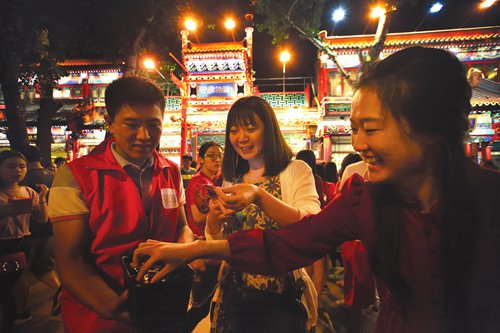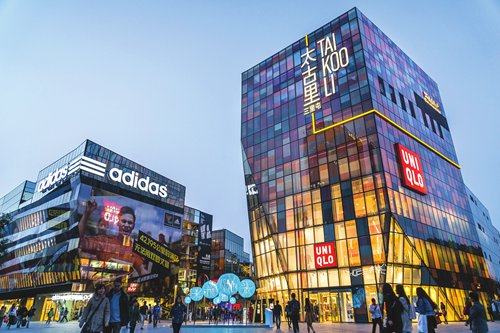HOME >> METRO BEIJING
Neon Economy
By Li Jieyi Source:Global Times Published: 2019/7/16 19:08:40
China expands late-night activities to meet people’s rising demands

Gourmets enjoy crayfish at Huda, a late-night restaurant in Beijing's Dongcheng district.

An enriching nightlife has been seen as a demonstration of a city's soft power in China. Photos: IC
How many choices do night owls have to spend their summer nights? They might need a restaurant to eat delicious food at midnight, late-night shops to buy something, or a 24-hour bookstore to browse through books and magazines. In a place like Sanlitun, Chaoyang district in Beijing, whatever they need, they can find at their fingertips.
This summer, Beijing has taken measures to inject vigor into the city, organizing diverse cultural events at night and encouraging malls, restaurants, convenience stores and key areas like Sanlitun to prolong business hours. The plan, which was written in
Beijing's 2019 Government Work Report in January, is a boost to consumer consumption and the nighttime economy.
As a result, subway Line 1 and Line 2 are going to prolong service time after midnight each Friday and Saturday. The new timetable will take effect from this week and run from May to October each year for the foreseeable future.
Adding options to people's nightlife has become a target for many big cites in China like Beijing, Tianjin and Shanghai.
"Each city should have its own particular advantage and style when developing the nighttime economy," said Zhou Shaopeng, a professor at the China National School, said in an interview with the Global Times.
Colorful nightlife
It was 10:30 pm on Friday when a 27-year-old woman surnamed Yao, who works in finance in Beijing, was browsing through books at Sanlian Taofen Bookstore located in Sanlitun. The lights were still bright and newcomers walked into the store from time to time. Some people sat next to the store's coffee bar, reading a book or working on their laptop. Others roamed from shelf to shelf, trying to find a book that they are interested in. Some of the customers stayed in the store and browsed all night.
Traditionally in China, when it comes to nightlife, people will think of eating Chinese barbeque outdoors or Karaoke Television (KTV). But currently, things are different.
"Now we have more choices for our nightlife," Yao said. She believes that the authority is supplying more choices for consumers by stimulating the nighttime economy, which mirrors the ongoing supply-side of structural reform in China. "If you are a social person, you can go to bars with friends. If you need personal space, 24-hour bookstores could be good choices," Yao said.
Living in an information age, people's nightlife has also extended from offline to online.
About seven years ago, if you want to eat barbeque with friends after a day's work, you had to go outside to find a restaurant. But currently, you can easily pick up your phone and order whatever you want on it and you may choose to spend your time on TikTok, the Chinese short video app, while waiting for the delivery man.
According to a Shanghai Observer's report, in 2018, Shanghainese consumed over 270,000 kebabs and 70,000 hamburgers at night. Most of these orders came from places like hospitals and offices in the CBD area.
"More people have time and extra money to spend on entertainment, and residents have a demand to enrich their nightlife," Zhou said.
Beijing is not the only city to stimulate its nighttime economy. Jinan and Nanchang, East China's Shandong and Jiangxi provinces respectively, also follow suit. And in 2017, North China's Hebei Province released a plan to enrich residents' nightlife and boost its economy.
Regional disparity
Mewlan Turaq, 26, from Kashgar in Northwest China's Xinjiang Uyghur Autonomous Region went to a local night market at 10:15 pm, planning to eat delicious food till late. Kashgar's geographic location makes it possible for people to enjoy the bright "white nights" in the summer. Around 2,000 kilometers away from Kashgar, Beijing is in the heart of the night's darkness, and when Bai Haoyue, who works in the video game industry, returns home after a day's work, convenience stores and supermarkets on both sides of the streets are all closed.
According to a report by ThePaper, Beijing is two times bigger than Shanghai in size, but its number of 24-hour convenience stores is half of Shanghai's.
In China, residents in tourist cities or eastern and southern coastal cities, many of which were known as sleepless towns, normally have more places to visit at night. An index ranking of cities' nightlife launched by China Business Network in 2017 shows that only three northern cities - Beijing, Qingdao and Xi'an - are on the top 20 list. Beijing ranks fourth after Shanghai, Shenzhen and Guangzhou.
Each city is different, but many of them are working on stimulating nighttime consumption this summer, especially by enriching residents' cultural lives. According to a xinhuanet.com's report, some pilot museums in Shanghai will unprecedentedly open at night each Friday from July to September. Tianjin's Nankai district is organizing cultural events like music festivals and art exhibitions to serve its residents.
Local governments have seen a flourishing nightlife as proof of a city's soft power. "The demands of young generations are getting more varied. We need multiple ways to relax ourselves," Yao said.
Stimulating the nighttime economy can not only make it possible for local residents to live more enriched lives, but can also attract more tourists. "By doing so, a city can create its own image and let people feel the charm of it," Zhou said.
Posted in: METRO BEIJING